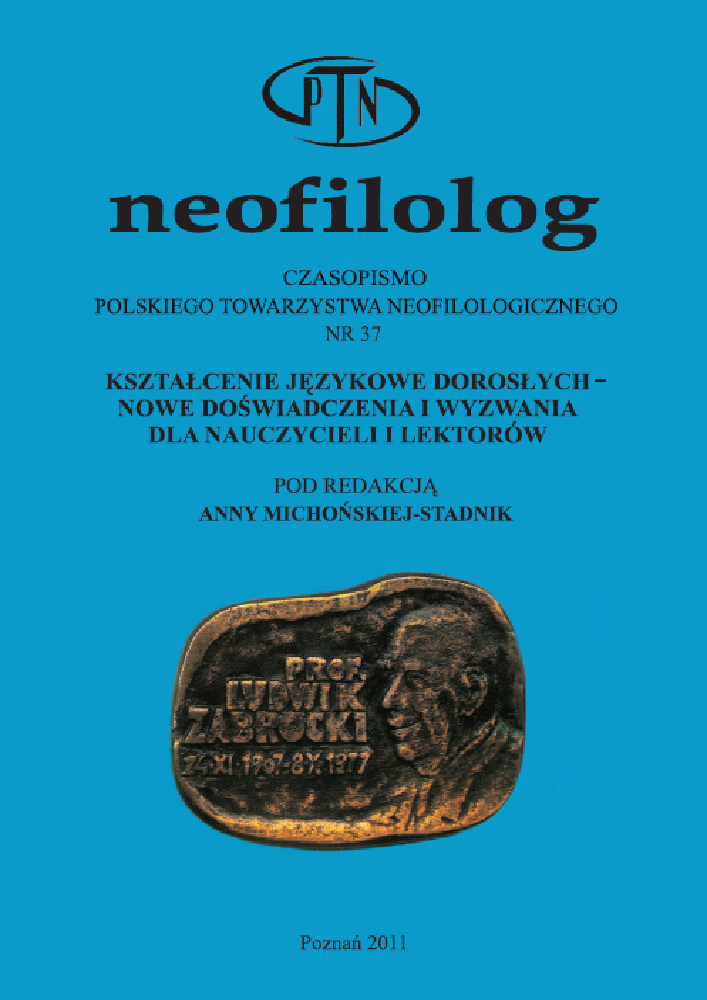Abstrakt
This paper concerns the teaching of foreign languages to adults with special attention given to the concept of motivation. The present author wishes to present the findings of his small-scale research done on a group of adults and their teachers as regards the sources of motivation in the context of adult language instruction. To begin with, an overview of the notion of mo-tivation is followed by its typology and current state of knowledge about teaching languages to adults is briefly outlined. The second part of the arti-cle demonstrates the procedure and results of the study.
Bibliografia
Arnold, J. i Brown, H. D. 2005. „A map of the terrain” (w:) Affect in language learning (red. J. Arnold) Cambridge: Cambridge University Press: 1-24.
Brown, H. D. 1990. „M&Ms for the language classroom? Another look at motivation” (w:) Georgetown University Round table on languages and linguistics (red. J. E. Alatis) Washington, DC: Georgetown University Press.
Chomsky, N. 1988. Language and problems of knowledge. Cambridge, MA: MIT Press.
Dörnyei, Z. 1990. „Conceptualizing motivation in foreign language learning”. Language Learning 40: 45-78.
Dörnyei, Z. 1994. „Motivation and motivating in the foreign language class-room”. Modern Language Journal 78: 273-284.
Dörnyei, Z. 2003. Questionnaires in second language research. Mahwah, NJ: Lawrence Erlbaum.
Figarski, W. 2003. Proces glottodydaktyczny w szkole. Warszawa: Wydawnictwa Uni-wersytetu Warszawskiego.
Gardner, R. C. i Lambert, W. 1972. Attitudes and motivation in second language learning. Rowley, MA: Newbury House.
Gardner, R. C. i MacIntyre, P. D. 1993. „A student’s contribution to second language learning. Part II: affective variables”. Language teaching 26: 1-11.
Humphreys, G. i. Spratt, M. 2008. „Many languages, many motivations. A study of Hong Kong students’ motivation to learn different target languages”. System 36: 607-623.
Knowles, M. S., Holton III, E. F. i Swanson, R. A. (red.) 2009. Edukacja doro-słych. Warszawa: PWN.
Lankiewicz, H. A. 2010. Foundations of second language acquisition. From theory to language pedagogy. Piła: Państwowa Wyższa Szkoła Zawodowa.
Marczuk, M. 1994. „Próba określenia andragonicznego modelu procesu kształcenia dorosłych” (w:) Problemy i dylematy andragogiki (red. M. Marczuk). Lublin-Radom: UMCS.
Maslow, A. 2006. Motywacja i osobowość. Warszawa: Wydawnictwo Naukowe PWN.
Michońska-Stadnik, A. 2008. „Pojęcie motywacji – wczoraj, dziś i jutro” (w:) Nowe spojrzenia na motywację w dydaktyce języków obcych. Tom 1. (red. A. Mi-chońska-Stadnik i Z. Wąsik). Wrocław: Wydawnictwo Wyższej Szkoły Filologicznej we Wrocławiu: 107-117.
Oxford, R. 2007. „Language learning strategies” (w:) Teaching English to speakers of other languages (red. R. Carter i D. Nunan) Cambridge: Cambridge Univer-sity Press: 166-173.
Weiner, B. 1985. „An attributional theory of achievement, motivation and emo-tion”. Psychological Review 92: 548-573.
Wilczyńska, W i Michońska-Stadnik, A. 2010. Metodologia badań w glottodydaktyce. Wprowadzenie. Kraków: Avalon.
Williams, M. i Burden, R. L. 2007. Psychology for language teachers. Cambridge: Cambridge University Press.
Zawadzka, E. 2004. Nauczyciele języków obcych w dobie przemian. Kraków: Impuls.
Licencja
Prawa autorskie (c) 1970 Tomasz Róg

Utwór dostępny jest na licencji Creative Commons Uznanie autorstwa – Bez utworów zależnych 4.0 Międzynarodowe.
Przedstawiany utwór (artykuł) upubliczniany jest na podstawie umowy z autorem i na licencji Creative Commons Attribution-NoDerivatives 4.0 International (CC BY-ND 4.0).
Użytkownicy mają obowiązek podania wraz z rozpowszechnionym utworem, informacji o autorstwie, tytule, źródle (odnośniki do oryginalnego utworu, DOI) oraz samej licencji;
- bez tworzenia utworów zależnych,
- utwór musi być zachowany w oryginalnej postaci.
Uniwersytet im. Adama Mickiewicza w Poznaniu zachowuje prawo do czasopisma jako całości (układ, forma graficzna, tytuł, projekt okładki, logo itp.).
